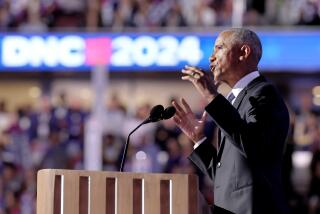For Gore and Kemp, Different Stump Roles : Democrat bashes GOP. Republican avoids red-meat attacks common to presidential running mates.
- Share via
WASHINGTON — It was on a steamy airport tarmac in Savannah, Ga., that Vice President Al Gore displayed two faces of his quest to reelect President Clinton.
“Sen. Bob Dole is a good and decent man,” Gore said politely of the Republican nominee for president. But in a moment he was bashing the “Dole-Gingrich Congress,” charging Republicans with a scary-sounding litany of planned offenses and revving up the sweaty crowd with the climactic vow: “But we won’t let them!”
At a campaign forum in Lancaster, Pa., meanwhile, GOP vice presidential hopeful Jack Kemp struck an entirely different tone, not even mentioning Clinton or Gore. “The Democrats are our opponents, not our enemies,” Kemp told the audience of female entrepreneurs. He then launched into a spirited defense of tax-rate cuts as a vehicle for economic growth.
As the presidential campaign eases toward its final stage, running mates Gore and Kemp, whose own careers could place them on a future collision course, are playing surprisingly different roles in a battle that is unfolding mostly outside the media spotlight.
For the most part, Gore has assumed a traditional vice presidential role, touting White House achievements and assailing the Republican ticket in a partisan manner that helps his boss remain somewhat above the fray.
Kemp, by contrast, has avoided the red-meat attacks that are a common duty of presidential running mates. In a recent interview on his campaign plane, he even said he planned to “write a little note” to Interior Secretary Bruce Babbitt to smooth things over after saying at a campaign stop that Babbitt would be the first person fired in a Dole administration.
Instead, Kemp is part salesman and part professor, seeking to explain Dole’s plan for a 15% across-the-board cut in income tax rates that he has made the centerpiece of his campaign but has not yet succeeded in selling to the public.
That was a decision made early in the campaign, Kemp said in the interview. When he and Dole first discussed his being on the ticket, “before I could get the words out of my mouth that I didn’t want to be an attack dog, he said he didn’t want me to be one, that he had had to play that role one time [in 1976] and that he didn’t like it either.”
“He said I wouldn’t be good at it, and I agreed with him.”
That leaves the job of being the campaign “heavy” to other Republican officials, Dole’s advertisements and, to some extent, Dole himself.
But that may be a reasonable trade-off for the campaign, said John J. Pitney, associate professor of government at Claremont McKenna College.
“The Republican Party is not wanting for attack dogs,” he said. “What Kemp needs to do is something different, that is, present a positive and optimistic vision for the Republican Party.”
Gore’s function, said Pitney, is to bolster Clinton’s own strengths, such as being seen as a non-ideological, new breed of Democrat. Kemp’s role is to communicate with voters. “Clinton picked Gore to bolster a strength,” Pitney said. “Dole picked Kemp to cover a weakness.”
In doing his job, Gore must be part cheerleader and part aggressor. Dole, he recently complained to the Democratic audience in Savannah, cast votes against Medicare, HeadStart, the Clean Air Act and the Peace Corps: “If he’s the most optimistic man in America, I’d hate to see the pessimist.”
He recently warned residents of Oak Ridge, Tenn., home of a national laboratory, that Dole’s spending proposals would turn their city into a “ghost town.”
At the same time, Gore serves as a vocal advocate for a range of White House aims, such as Clinton’s proposal to create a $1,500 tax credit to help students pay for post-high school education. In an earnest, down-to-earth style that routinely wins over his audience, Gore touts Clinton’s call for “building a bridge to the 21st century” through programs for education, training, environmental cleanup and other areas.
“We want an America where every child can go to college,” Gore says.
It is the other, more aggressive side of Gore’s role, however, that has caused sparks to fly.
In late August, Kemp fired off a letter to the vice president, complaining about Gore’s rhetoric. At issue: Gore’s reference to Dole as one half of “a two-headed monster,” with Gingrich being the other head.
Not that the Clinton-Gore campaign is prepared to cede the moral high ground to its GOP rivals. At their national convention, Democratic Party officials called for greater civility in the political debate, and Kemp’s own comments have prompted criticism from the Democrats.
“Jack Kemp should really look inward before asking Al Gore to modify his campaign style,” said Joe Lockhart, citing Kemp speeches that blame the president personally for the nation’s drug problems and knock White House economic policies.
Typically, Kemp prefers to talk about ideas. Whether it’s a Harlem soul food restaurant, a block party in Flint, Mich., or a Chamber of Commerce luncheon in Hartford, Conn., he repeats the themes he has been touting for years: the need for tax cuts to expand the economy, more outreach in minority communities and an end to divisions along racial or economic lines.
Even when the government reported last week that unemployment had fallen in August to a seven-year low of 5.1%, Kemp argued that the economy was still too sluggish for his taste. He again asked supporters, this time at an Atlanta hotel, to raise their hands.
“The president keeps saying this is the best economy in 30 years. Raise your hands if you think so. It isn’t to suggest that there hasn’t been an uptick, but we’re not doing well enough.”
Not one hand went in the air. Still, Gore’s job of promoting the administration’s record on the economy may be the easier task, given today’s low unemployment and modest inflation. At campaign stops, the vice president regularly ticks off the supporting evidence, including 10.5 million new jobs during Clinton’s tenure and a budget deficit slashed by 60%.
“We need to stay on track and not make a radical, right-wing U-turn, just as American workers are getting a dividend from the growth in our economy,” Gore said in Oak Ridge.
Although it would not be seemly for a running mate to emphasize it, Gore and Kemp can’t help but consider political possibilities that come after the 1996 election. In his own way, each running mate has a self-interest that could keep them on opposing sides for years.
And Kemp has made clear that he is aiming to reposition the Republican Party completely by reaching out to minority voters and wiping out the notion that his is the party of the rich. By 2000, Kemp says, he wants half of the country’s African Americans to be registered Republicans.
Unlike Kemp, who seemed headed for political oblivion before Dole plucked him to be his running mate, Gore has established himself as a leading contender for his party’s presidential nomination in 2000, a factor that adds some electricity to his public appearances.
As the Savannah crowd chanted, “Four more years,” in anticipation of Gore’s arrival, one loyalist prompted laughter by shouting, “Twelve more years!”
More to Read
Get the L.A. Times Politics newsletter
Deeply reported insights into legislation, politics and policy from Sacramento, Washington and beyond. In your inbox twice per week.
You may occasionally receive promotional content from the Los Angeles Times.










